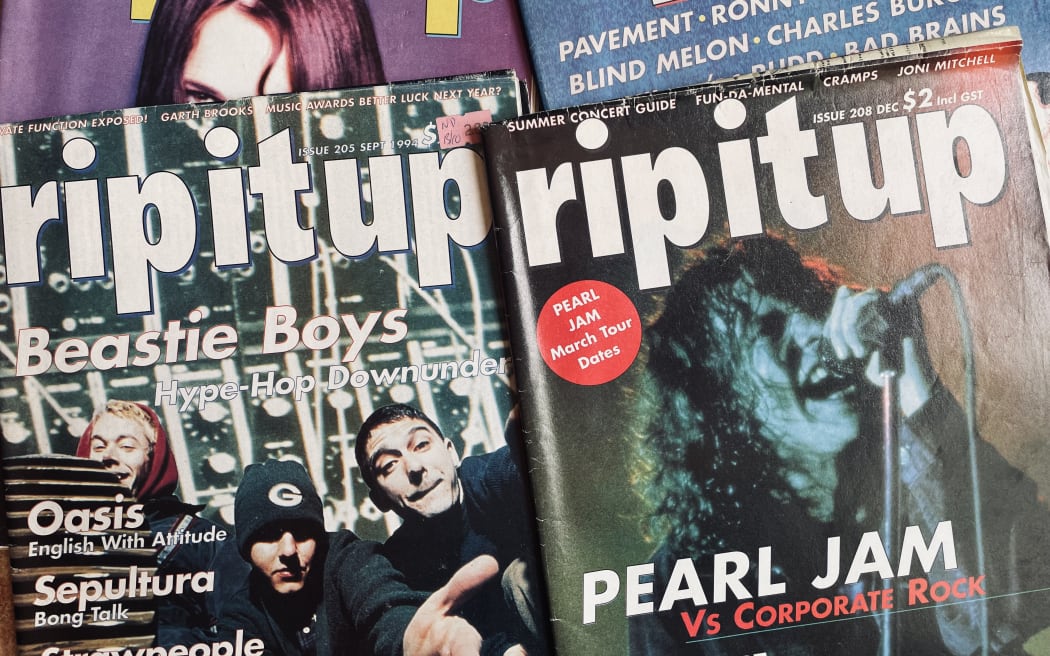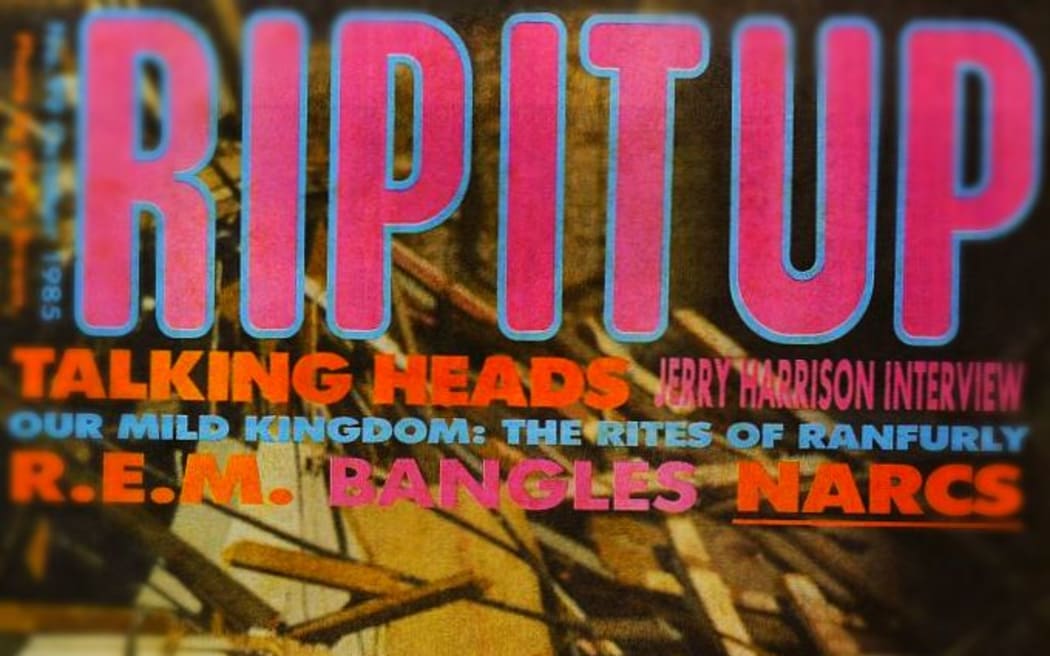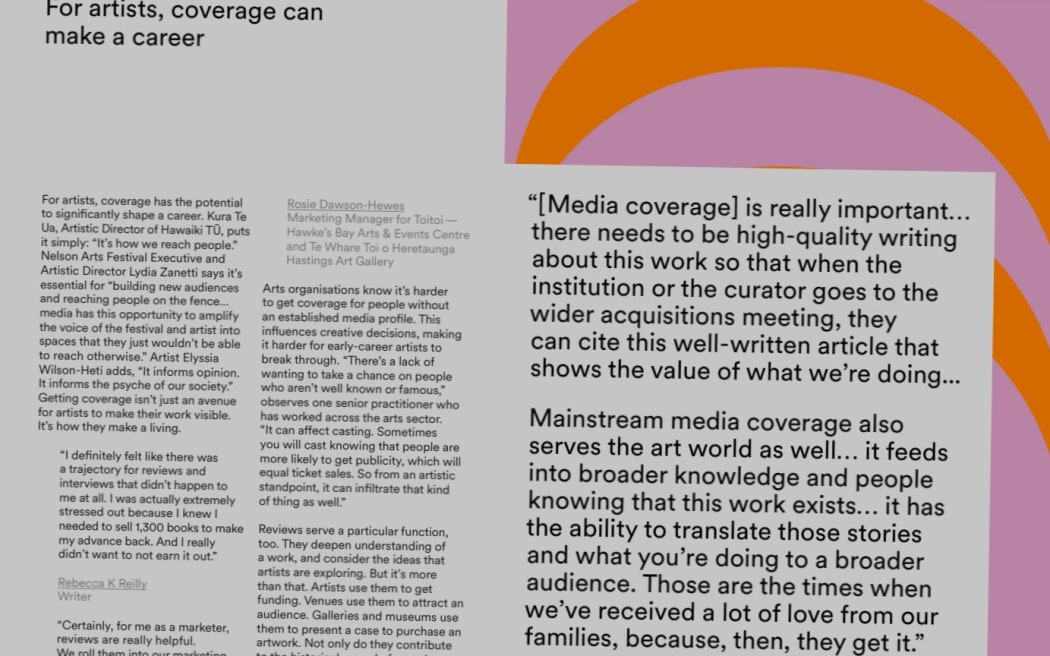
The now defunct Rip It Up covered the music scene in Aotearoa from 1977 until 2015. Photo: RNZ / Nik Dirga
This week the country’s biggest arts funding agency published a plan to boost coverage of culture which has been dwindling in our media.
Music reviews and writing used to be eagerly read and hotly contested in our papers and magazines. We ask a former entertainment editor where that went and what could bring it back.
Back in July, arts funding outfit Creative New Zealand inadvertently picked a pretty intense week to release a new survey called Visibility Matters - which showed media coverage of culture was dwindling.
One day earlier the media published a flood of stories about the crimes of multi-millionaire arts patron Sir James Wallace - described by many in the media as a “worst kept secret” while his name was suppressed.
But the Visibility Matters survey’s finding that arts and culture got just half of the space in our media that is devoted to sport these days - that was not news to people in the arts.
That report was prompted in part by longtime arts writer Mark Amery, now the co-host of RNZ’s Culture 101, every Sunday at 1pm here on RNZ National.
At the time he told Mediawatch one of the problems was that arts events with a PR push behind them did get coverage in advance - but critical analysis of them was harder to find.
“Too much preview, not enough review” in other words.
Creative New Zealand followed up Visibility Matters with another report this week - New Mirrors – all about ways to strengthen arts and culture media in Aotearoa New Zealand.
It suggests setting up a new funding pool devoted specifically to culture reporting and establishing an agency modelled on the Science Media Centre, aimed at helping news outlets facilitate and organise their arts coverage.
Chris Schulz, a former entertainment editor for The New Zealand Herald and Stuff, is relieved that others are jumping on the bandwagon he boarded some months ago.
He's written several times about the dearth of music journalism in New Zealand on his Substack blog Boiler Room, noting that several major music festivals received no mainstream media coverage, and musicians are struggling to get more than a single interview after releasing albums.
That marks a stark change from when he started in journalism.

Rip It Up covered everything musical that moved (well, most things) 40 years ago. There's no such coverage now. Photo: RNZ Mediawatch
Back then, writers could specialise in a genre of music - covering alternative or hip hop at Real Groove magazine or rock or pop at Rip It Up - or take on a more broad ambit of entertainment reporting at a publication like the Herald's Time Out. All those publications are now gone.
"You're not here talking to Tova O'Brien about the death of political coverage, or Dylan Cleaver about the death of sports reporting. And look, this is the bleakest pivot I could make as a journalist right from, from covering music for 20 years to discussing the death of music coverage.
"I don't want to be doing this. I don't want to be talking about this," he says.
Media organisations are struggling at the moment, with several undergoing restructures or laying off staff.
New Mirrors says arts reporting is often the "canary in the coalmine" in that kind of environment, getting cut first because it's not seen as being at the core of a news outlet's business.

A page from Creative NZ's 'New Mirrors' report on media coverage of culture. Photo: supplied
Schulz acknowledges it can be a struggle to win audiences for music and arts coverage, but says it's possible if outlets invest in journalists who know their subject area well and can deliver comprehensive, interesting reporting.
As things stand, culture reporting is subject to a vicious cycle in which underinvestment in reporters leads to lower audience numbers and vice versa, he says.
"When you lose that experience in a newsroom, when when you're not digging in to get the stories that really matter, then you're not going to get those clicks," he says.
"But when you when you don't see Lorde or Taika Waititi on the same pages and on the same website as the All Blacks or political figures or business leaders then you're almost saying 'that doesn't matter'. 'We don't care anymore.' That's wrong to me. I refuse to believe that."
Schulz is a fan of New Mirrors' 'Science Media Centre for Arts' idea. He likes the idea of additional funding streams for arts reporting.
But he doesn't have much hope that addressing deficiencies in arts reporting will be a priority for the new government.
In his eyes, the only way to restore entertainment and arts reporting to its former levels might be to rebuild it from the ground up.
"You've got to you've got to find the people who still want to do it. I mean, are they even in a journalism school? Is anyone saying, 'hey, I want to cover music'. Only an idiot would do that at the moment, right? There's no career path here in New Zealand anymore.
"So you almost have to go back to basics there and talk to journalism school heads and say, 'who's coming through?' and 'Can we get them on and start mentoring them'. That's what we need."
You can hear from the authors of Creative NZ New Mirrors report on Culture 101 next Sunday afternoon on RNZ National.


